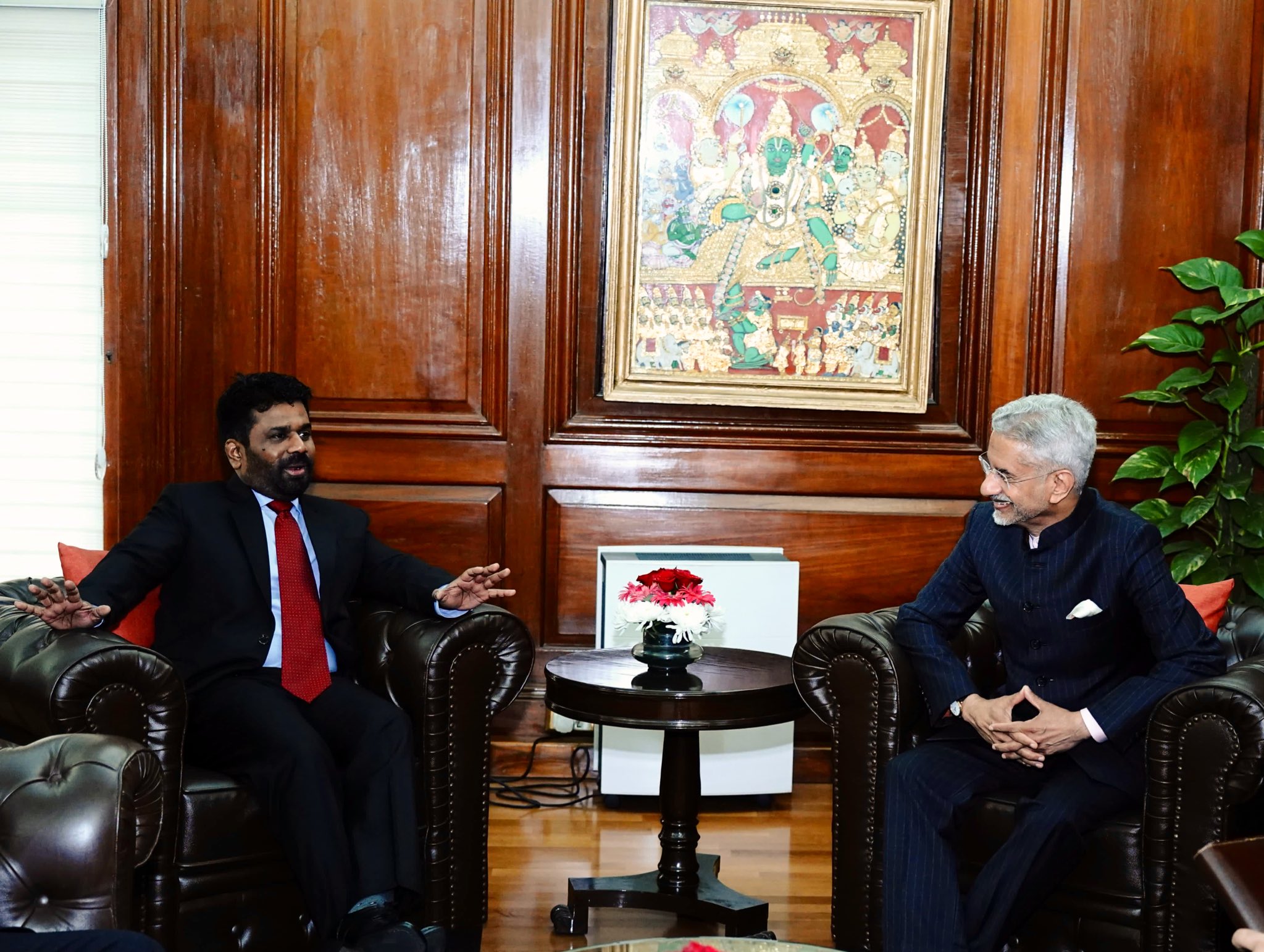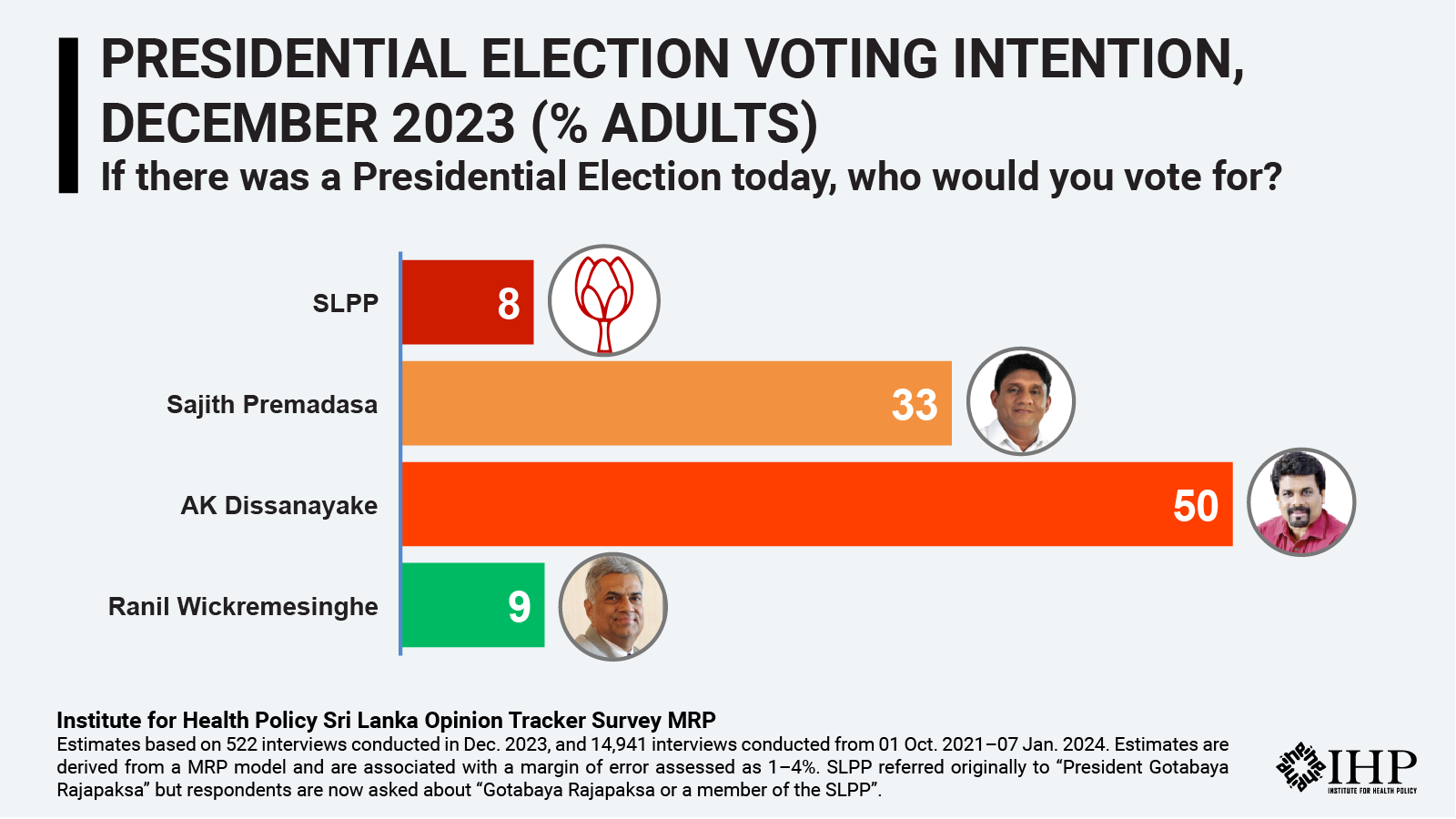 (Photo courtesy: Dr. S. Jaishankar X)
(Photo courtesy: Dr. S. Jaishankar X)
On Monday (5), the leader of Janatha Vimukthi Peramuna (JVP) and National People’s Power (NPP) coalition, Anura Kumara Dissanayake, met with India’s External Affairs Minister Dr. S. Jaishankar, after the party was invited to discussion in Delhi for the first time.
The visit is seen as a significant outreach by Delhi to the leftist politician, ahead of widely expected presidential polls in Sri Lanka later this year and marks a possible change of heart from the JVP’s fiercely anti-India rhetoric that came to define its politics in the 1980s.
Dissanayake along with Vijitha Herath, the National Executive Member of the NPP are presently in India on an invitation from the Indian government to meet with politicians, government officials, and members of the business community. During the five-day official visit, Dissanayake and his delegation will tour New Delhi, Ahmedabad, and Thiruvananthapuram.
Dr Jaishankar in a tweet said they discussed the country’s economic challenges and the path ahead. “India, with its Neighbourhood First and SAGAR policies will always be a reliable friend and trusted partner of Sri Lanka,” he added,
Pleased to meet @anuradisanayake, Leader of NPP and JVP of Sri Lanka this morning.
A good discussion on our bilateral relationship and the mutual benefits from its further deepening. Also spoke about Sri Lanka’s economic challenges and the path ahead.
India, with its… pic.twitter.com/5cJJwaTB3o
— Dr. S. Jaishankar (@DrSJaishankar) February 5, 2024
Dissanayake who also tweeted yesterday said he had held discussions at Sardar Patel Bhavan where he met the National Security Adviser of the Government of India, Mr. Ajit Doval. “At this meeting, we discussed regional security and bilateral relations between Sri Lanka and India,” Dissanayake said adding that Vijitha Herath also joined the discussion.
This afternoon (05) at Sardar Patel Bhavan, I met the National Security Adviser of the Government of India, Mr. Ajit Doval.
At this meeting, we discussed regional security and bilateral relations between Sri Lanka and India.
Comrade Vijitha Herath, the National Executive Member… pic.twitter.com/HTk3UeGwcu
— Anura Kumara Dissanayake (@anuradisanayake) February 5, 2024
Sources within the JVP told the Tamil Guardian that the invitation by India in itself is a sign that Delhi recognises the party’s popularity. The meeting is a milestone for Dissanayake who ranks high according to a survey on voting preferences ahead of the presidential polls.
The Institute of Health Policy, a think-tank based in Colombo found that Dissanayake leads in Presidential Election voting preferences on 50%, with Sajith Premadasa on 33% of all adults in December based on voting intentions. IHP’s Sri Lanka Opinion Tracker Survey (SLOTS) MRP estimates of Presidential Election voting intent in December 2023 show NPP/JVP leader AK Dissanayake on 50% of all adults, ahead of Sajith Premadasa, the SJB leader, with 33%, Pres. Ranil Wickremesinghe on 9% and a generic SLPP candidate on 8%.

However, the JVP, which has historically held a frosty view of relations with its northern neighbour, has yet to clarify on any policy decisions with regards to Delhi. The JVP has a storied history in Sri Lanka having staged two insurrections against the state in the early 1970s and the late 1980s. The latter of these was chiefly in response to the Indo-Lanka accord and the 13th Amendment which sought to devolve powers to Tamils in the North-East. Then leader Rohana Wijeweera framed Tamil demands for self-determination as in-hoc with US imperialist interests in his 1986 book “Solutions for Tamil Eelam Struggle”.
Last year Dissanayake called upon Sri Lanka's president Wickremesinghe to clarify his position on the implementation of the 13th Amendment. Dissanayake said at the rally that Wickremesinghe had no genuine intention to implement the 13th Amendment and claimed that he was instead strategically using the debate surrounding the amendment to build momentum for a potential presidential election.
Yet, at the same time the JVP has been staunchly opposed to the devolution of police powers - a key component of the 13th Amendment. In September 2020, Dissanayake even called for the abolition of the provincial council system.
Throughout the armed conflict, the JVP would weaponize the pretence of Marxism to justify their hardline opposition to Tamil demands. In the 2004 parliamentary elections, the JVP became a coalition partner of the United Peoples Freedom Alliance (UPFA) and stood opposed to continued peace negotiations with the LTTE; they further rejected the possibility of joint post-tsunami aid distribution, and in 2005 endorsed Mahinda Rajapaksa on a platform specifically opposed to the peace process. In early 2006 the JVP openly promoted a military solution that would culminate in the Mullivaikkal genocide.
During peace talks between the LTTE and the Sri Lankan government, the JVP would consistently protest against the ceasefire – slamming international mediation and the concept of granting devolution or autonomy to the Tamil homeland.
In 2015, JVP Propaganda Secretary and Member of Parliament Vijitha Herath told The Island, "the JVP is against federalism”. Whilst accepting that “the grievances of the Tamil people should be redressed,” Herath reiterated that “federalism is not that solution”. He also spoke out against the merging of the Northern and Eastern provinces, as outlined by the Indo-Lanka accord, which saw the 13th amendment of the Sri Lankan constitution signed. “It is the JVP that went before the courts and got an order to demerge the two provinces that had been arbitrarily merged after the Indo-Lanka Accord,” he added, referring to when the JVP filed three separate petitions with the Supreme Court of Sri Lanka calling for the North Eastern Province to be demerged. The Province was formally demerged into the Northern and Eastern provinces on 1 January 2007.
In 2016 Dissanayake attacked Tamil political parties insinuating that they were spreading hate in the country’s North.
The JVP’s staunch opposition to Tamil nationalism continues to this day.
We need your support
Sri Lanka is one of the most dangerous places in the world to be a journalist. Tamil journalists are particularly at threat, with at least 41 media workers known to have been killed by the Sri Lankan state or its paramilitaries during and after the armed conflict.
Despite the risks, our team on the ground remain committed to providing detailed and accurate reporting of developments in the Tamil homeland, across the island and around the world, as well as providing expert analysis and insight from the Tamil point of view
We need your support in keeping our journalism going. Support our work today.
For more ways to donate visit https://donate.tamilguardian.com.

